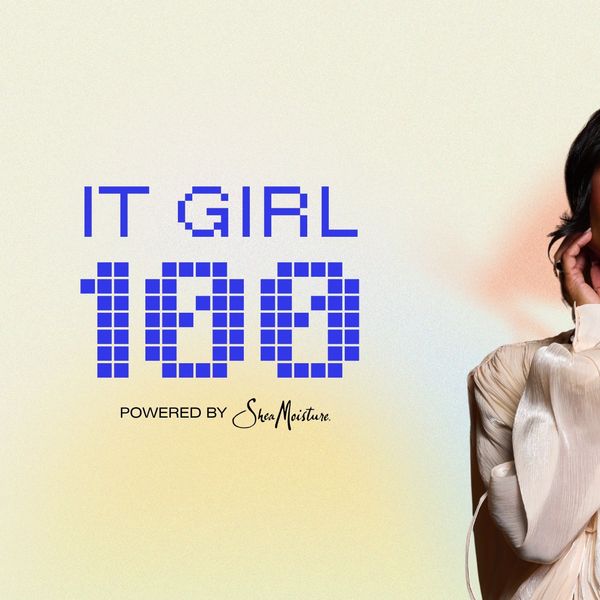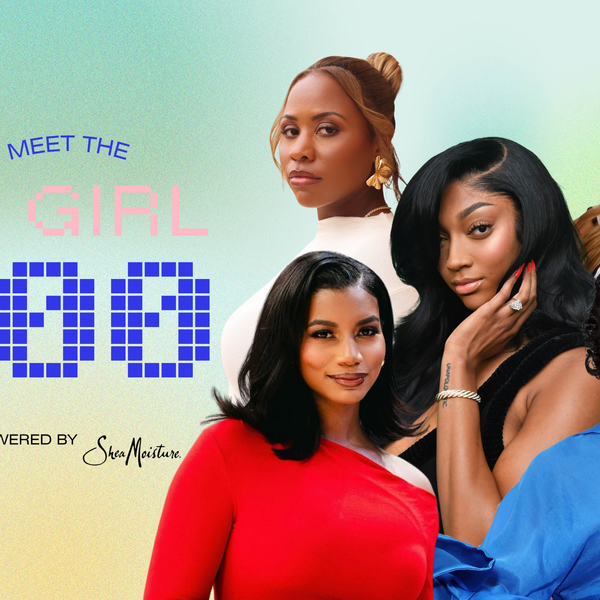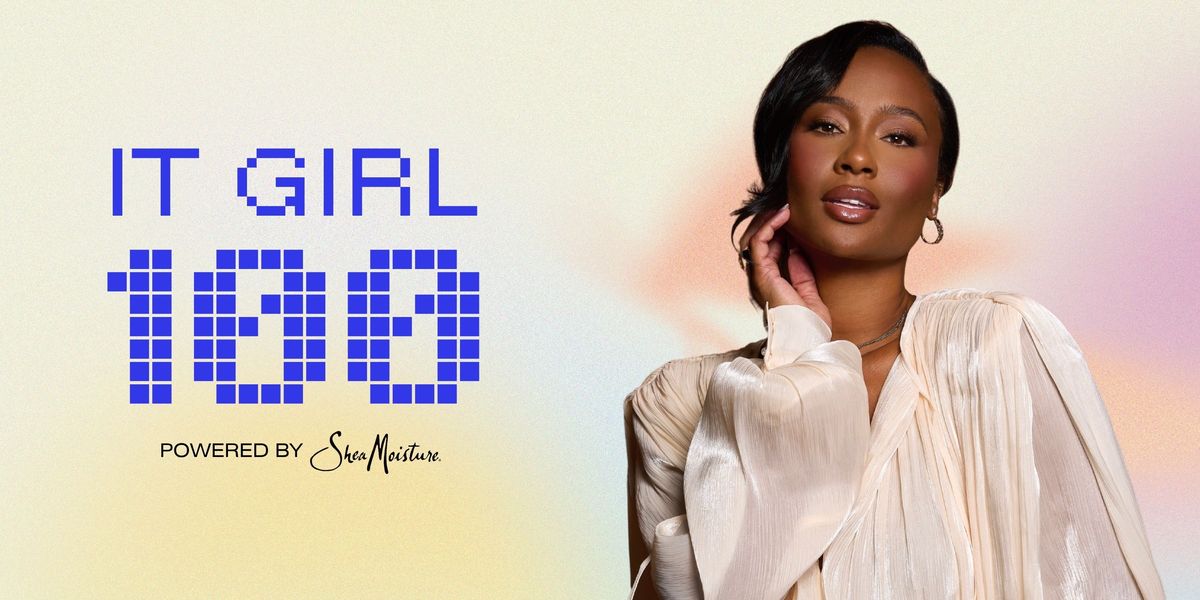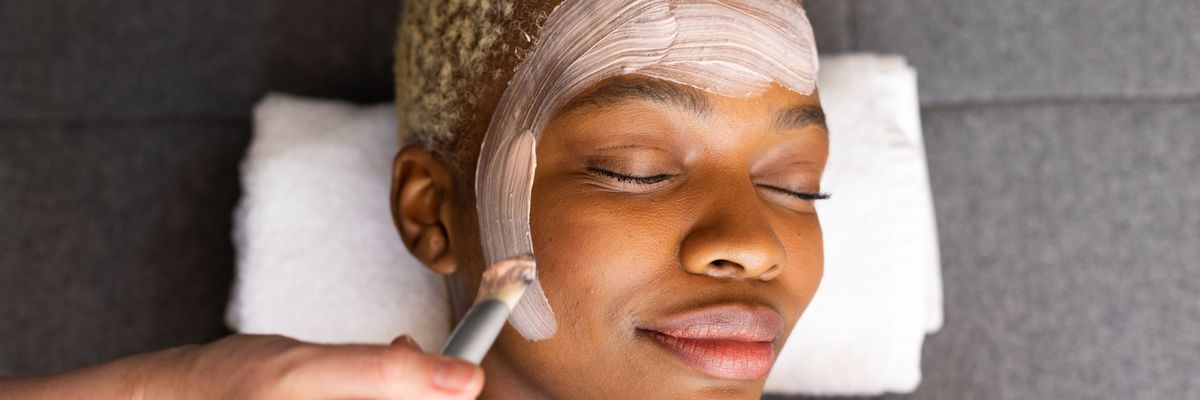5 Reasons 'Coming 2 America' Is A Lit Experience For The Culture

This article is in partnership with Amazon Prime.
Eddie Murphy's sequel to his 1988 hit Coming to America, had anticipation and nostalgia on its side, drawing old fans along with a new generation of their children and grandchildren who were just conceived or babies when the original hit big screens. From grandmas to Generation Z, we all tuned in, landing the film a top spot in Amazon streaming during its opening weekend.
It's no surprise that with the Wakanda craze, the beautiful depictions of Black Hollywood magic, and the resurgence of the unforgettable comic bits that had many of us cracking up back in the day, we'd all be excited to see an updated version of what happened in the kingdom of Zamunda. We also watched to see how the star-studded cast--which included both veterans and newbies—would fit into it all.
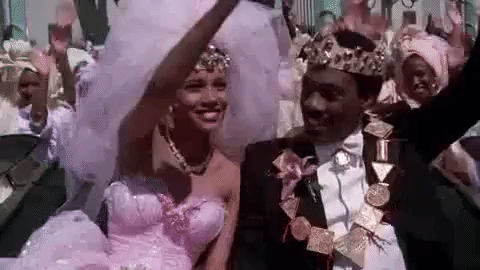
Image via Giphy
The thing about sequels is, you either love them or hate them, and many of us seek the same euphoria, if not a boost in it, when we watch a continuation of a cult classic. Coming 2 America gave us the same laughs and more, with the bonus of infusing today's social issues that affect us all, adding actors from the African continent, and catering to today's youth in both attire and soundtrack. It provided a much-needed escape into dad-jokes, cultural satire, wacky cameos, and Black pride that we all need right now.
Still not a believer? Here are 5 good reasons the film is a lit, must-see experience for the culture:
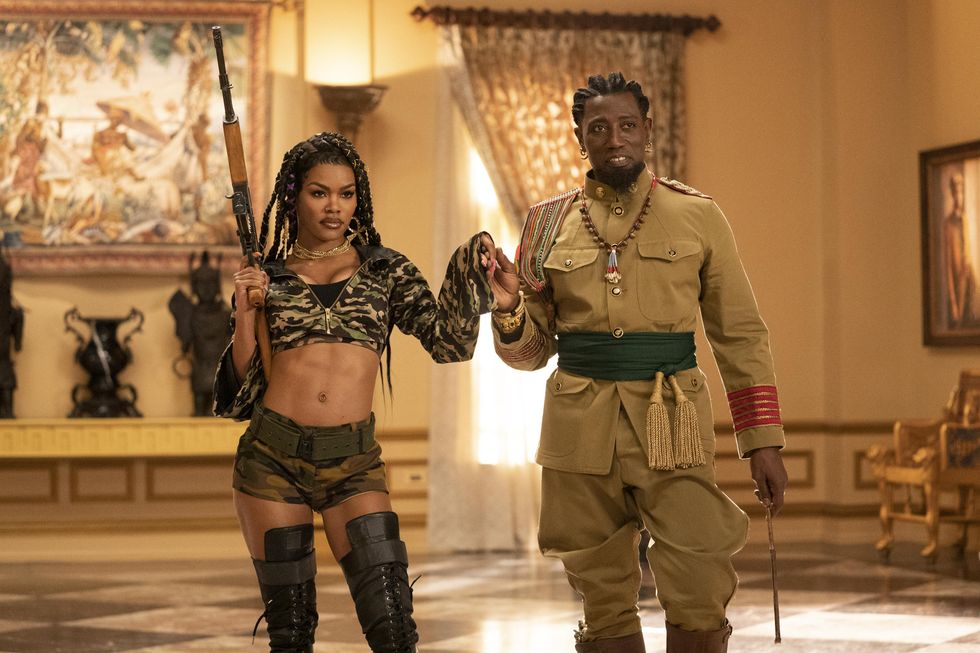
Image courtesy of Amazon Studios
1. A good number of Black Hollywood legends with young power players—in one film? Count me in.
Just the inclusion of actors like Morgan Freeman, Arsenio Hall, Wesley Snipes, James Earl Jones, John Amos, Tracy Morgan, Gladys Knight, and Vanessa Bell Calloway is enough to pay homage to the fact that we need to not only give our cinematic kings and queens their flowers while alive, but we should salute the fact that they're still honoring us with their talents. These actors have not only paved the way for actors of color in Hollywood to continue working and getting that coin, but many have been riders for opening opportunities for the new generation of entertainers behind the scenes.

Image Courtesy of Amazon Studios
2. Black women dominate and female empowerment is more than present.
Not only did the film include a push for female equality, but the women on the cast and behind the scenes slayed their roles, both in beauty and in alluring range of character. The original Princess of Zamunda, Lisa McDowell (played by Shari Headley) was just as graceful and Black-don't-crack beautiful—with the Queens-bred edge—as she was more than 30 years ago. Leslie Jones brought humor and authenticity to her role as Mary Junsen and was a breakout star who helped carry many of the scenes in which she was featured.
Teyana Taylor brought her usual bold sexiness and a swag-savvy remix to Vanessa Bell Calloway's 1988 jilted-bride role. Nomzamo Mbatha, an award-winning South African actress, gave her all in a renewed love story with the new prince, LaVelle Junsen (played by Jermaine Fowler), and represented for Black womenpreneurs. And last but not least, the three young actresses who played the new princesses of Zumanda—KiKi Layne, Bella Murphy, and Akileh Love—portrayed agile, smart, and compassionate young women who will have you lovingly reminiscing about the power-packed fem sensations in Black Panther. Also, the whole fashion aesthetic of the film was led by Oscar-winning costumer Ruth E. Carter, the first black person to get the honor in the "Best Costume Design" category.

Image courtesy of Amazon Studios
3. African excellence from the continent was actually easy to spot this go 'round.
From superstar Nigerian entertainer Davido, to cameos from Nigerian-American actor Rotimi and late-night host and South African comedian Trevor Noah, this sequel gives us Afrobeat, glamorous geles, and fashion designs that add at least a touch more authenticity. South African designer Laduma Ngxokolo's knitwear label, Maxhosa, was featured prominently as part of the characters' wardrobes, as well as jerseys by Ghanian-American designer Paakow Essandoh.
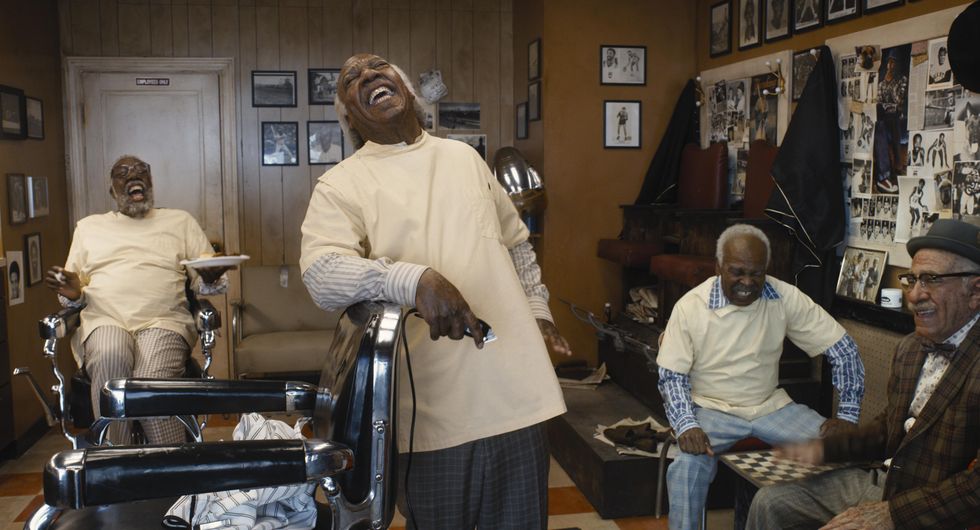
Image courtesy of Amazon Studios
4. The OG favorite characters from the original don't disappoint.
Almost all of our favorite original characters, played by Murphy and Hall in disguise, are back, older, and a tad funnier because of that. The barber elders are relatable whether you grew up in the '80s or not, and everybody knows that OG uncle who offers unsolicited, sometimes inappropriate but oftentimes funny, real-talk quips. We all also know the old-school pastor who might have some semi-shady but hilarious approaches to preaching, or the non-singing crooner who always wants to take over the mic at a wedding, karaoke session, concert or other family event. There's even a new character whose grotesque demeanor and look actually gives Arsenio Hall a run for his money in his primary role as Semmi.
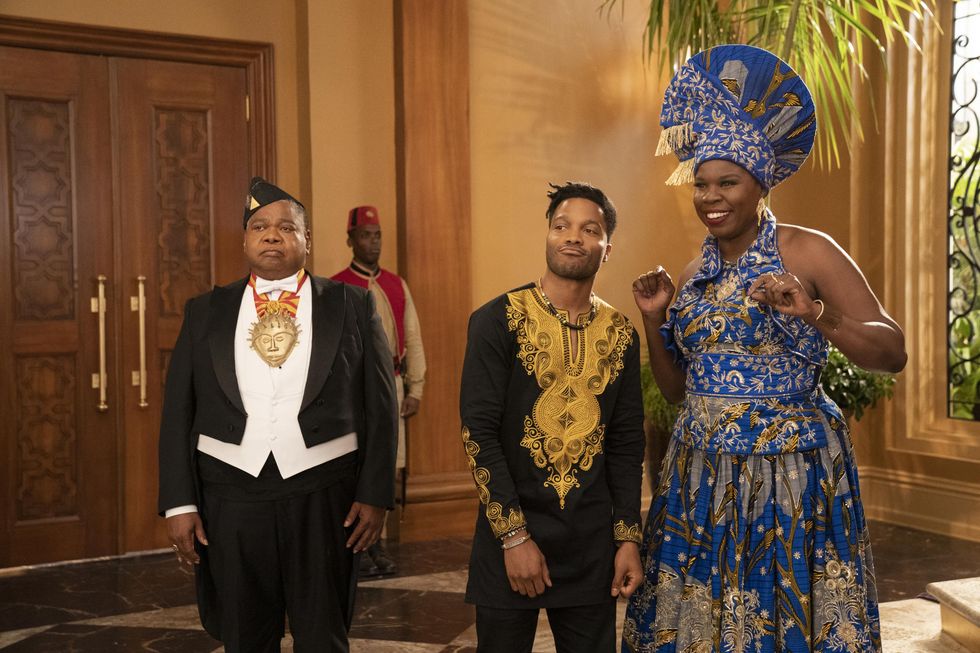
Image courtesy of Amazon Studios
5. It's a much-needed escape from the current state of the world.
The flashbacks will have you reminiscing—or at least yearning—for a time when quarter-waters were actually 25 cents, the Internet and cell phones didn't dominate much of our lives, cities had a lot more grit and soul, and oh, there was no Coronavirus pandemic. True, there were major world issues in the '80s, but some aspects of life were a lot less scary and isolating. Every inclusion or reference to Jheri curls, rattails, stonewash jeans, flat-tops, stacked cuts, and high-cut bikinis, and that old-school love-at-first-sight plot is much appreciated at a time when masks, Hazmat suits, vaccinations, and social distancing have dominated our everyday lives.
Coming 2 America is now streaming on Amazon Prime.
Featured image courtesy of Amazon Studios
Exclusive: Viral It Girl Kayla Nicole Is Reclaiming The Mic—And The Narrative
It’s nice to have a podcast when you’re constantly trending online. One week after setting timelines ablaze on Halloween, Kayla Nicole released an episode of her Dear Media pop culture podcast, The Pre-Game, where she took listeners behind the scenes of her viral costume.
The 34-year-old had been torn between dressing up as Beyoncé or Toni Braxton, she says in the episode. She couldn’t decide which version of Bey she’d be, though. Two days before the holiday, she locked in her choice, filming a short recreation of Braxton’s “He Wasn’t Man Enough for Me” music video that has since garnered nearly 6.5M views on TikTok.
Kayla Nicole says she wore a dress that was once worn by Braxton herself for the Halloween costume. “It’s not a secret Toni is more on the petite side. I’m obsessed with all 5’2” of her,” she tells xoNecole via email. “But I’m 5’10'' and not missing any meals, honey, so to my surprise, when I got the dress and it actually fit, I knew it was destiny.”
The episode was the perfect way for the multihyphenate to take control of her own narrative. By addressing the viral moment on her own platform, she was able to stir the conversation and keep the focus on her adoration for Braxton, an artist she says she grew up listening to and who still makes her most-played playlist every year. Elsewhere, she likely would’ve received questions about whether or not the costume was a subliminal aimed at her ex-boyfriend and his pop star fiancée. “I think that people will try to project their own narratives, right?” she said, hinting at this in the episode. “But, for me personally – I think it’s very important to say this in this moment – I’m not in the business of tearing other women down. I’m in the business of celebrating them.”
Kayla Nicole is among xoNecole’s It Girl 100 Class of 2025, powered by SheaMoisture, recognized in the Viral Voices category for her work in media and the trends she sets on our timelines, all while prioritizing her own mental and physical health. As she puts it: “Yes, I’m curating conversations on my podcast The Pre-Game, and cultivating community with my wellness brand Tribe Therepē.”
Despite being the frequent topic of conversation online, Kayla Nicole says she’s learning to take advantage of her growing social media platform without becoming consumed by it. “I refuse to let the internet consume me. It’s supposed to be a resource and tool for connection, so if it becomes anything beyond that I will log out,” she says.
On The Pre-Game, which launched earlier this year, she has positioned herself as listeners “homegirl.” “There’s definitely a delicate dance between being genuine and oversharing, and I’ve had to learn that the hard way. Now I share from a place of reflection, not reaction,” she says. “If it can help someone feel seen or less alone, I’ll talk about it within reason. But I’ve certainly learned to protect parts of my life that I cherish most. I share what serves connection but doesn’t cost me peace.
"I refuse to let the internet consume me. It’s supposed to be a resource and tool for connection, so if it becomes anything beyond that I will log out."

Credit: Malcolm Roberson
Throughout each episode, she sips a cocktail and addresses trending topics (even when they involve herself). It’s a platform the Pepperdine University alumnus has been preparing to have since she graduated with a degree in broadcast journalism, with a concentration in political science.
“I just knew I was going to end up on a local news network at the head anchor table, breaking high speed chases, and tossing it to the weather girl,” she says. Instead, she ended up working as an assistant at TMZ before covering sports as a freelance reporter. (She’s said she didn’t work for ESPN, despite previous reports saying otherwise.) The Pre-Game combines her love for pop culture and sports in a way that once felt inaccessible to her in traditional media.
She’s not just a podcaster, though. When she’s not behind the mic, taking acting classes or making her New York Fashion Week debut, Kayla Nicole is also busy elevating her wellness brand Tribe Therepē, where she shares her workouts and the workout equipment that helps her look chic while staying fit. She says the brand will add apparel to its line up in early 2026.
“Tribe Therepē has evolved into exactly what I have always envisioned. A community of women who care about being fit not just for the aesthetic, but for their mental and emotional well-being too. It’s grounded. It’s feminine. It’s strong,” she says. “And honestly, it's a reflection of where I am in my life right now. I feel so damn good - mentally, emotionally, and physically. And I am grateful to be in a space where I can pour that love and light back into the community that continues to pour into me.”
Tap into the full It Girl 100 Class of 2025 and meet all the women changing game this year and beyond. See the full list here.
Featured image by Malcolm Roberson
What Happens In Vegas Ends In…Wellness? My Black Girl Luxury Weekend At Caesars Palace
Caesars Palace showed me that Las Vegas isn’t just the city that never sleeps — it’s also a place where Black women can rest, play, and find joy.
On TV and in movies, you always see the nightclubs, the casinos, the action of the Strip. And yes, that’s true. So I naturally didn’t think that I could find rest in Vegas, but I’ve never been more glad to be wrong.
Aside from this trip, I’d only been to Vegas once — and it was quick. I was speaking on a panel in LA for CultureCon during Juneteenth weekend when I realized Usher’s residency had a date when I’d be nearby. I bought a last-minute (expensive, but worth it) ticket and flew in for less than 24 hours just to see him. Worth every dime. This time, though, I was curious to see what else the city had for me.
As a guest of Caesars Entertainment, I was invited to experience the softer side of Vegas, specifically their first-ever spa buffet experience. We often look at Vegas as a place for casinos, elaborate shows, world-class dining, and nightlife. Now I won’t debate that all of that is true — but there’s so much overlooked relaxation tucked away in every corner.
Let’s Talk Accommodations
I stayed at Caesars Palace and my suite in the Augustus Tower opened to sparkling views of the Strip, with the Eiffel Tower twinkling in the distance. My itinerary was filled with champagne dinners, luxury SUV car service by Caesars Entertainment (that knew how to navigate around the Strip traffic effortlessly), and hours indulging in their new All You Can Spa program at The LINQ — a playful twist on the buffets the city is so famous for.
Honestly, my first thought of Caesars Palace was Think Like a Man Too, which was filmed here. But walking into the property myself, it felt bigger, grander. Like I’d stepped out of the country without leaving the desert. Caesars Palace was originally built to bring the grandeur of Rome to the strip— and it worked. The first time I experienced Rome was as a teenager, and staying here felt like I had some of that nostalgia with me, only a four-hour flight away.

Courtesy
From my room, I could see the Eiffel Tower glittering across the way. All of it, as designed, felt very royal. My dad has called me the Princess of Zamunda since I was little (so much so that I thought Zamunda was a real place lol), so it was very on-brand for me to stay at Caesars Palace for her first full weekend in Vegas.
Because the legendary Qua Baths & Spa at Caesars Palace was under renovation (I can’t wait to return when it opens), I had the chance to try The Spa at The LINQ — home of the new All You Can Spa experience. And truthfully, every treatment felt curated just for me. Guests are given four hours to build their own spa “buffet,” choosing from facials, scrubs, wraps, and massages.
Here’s every service I had:
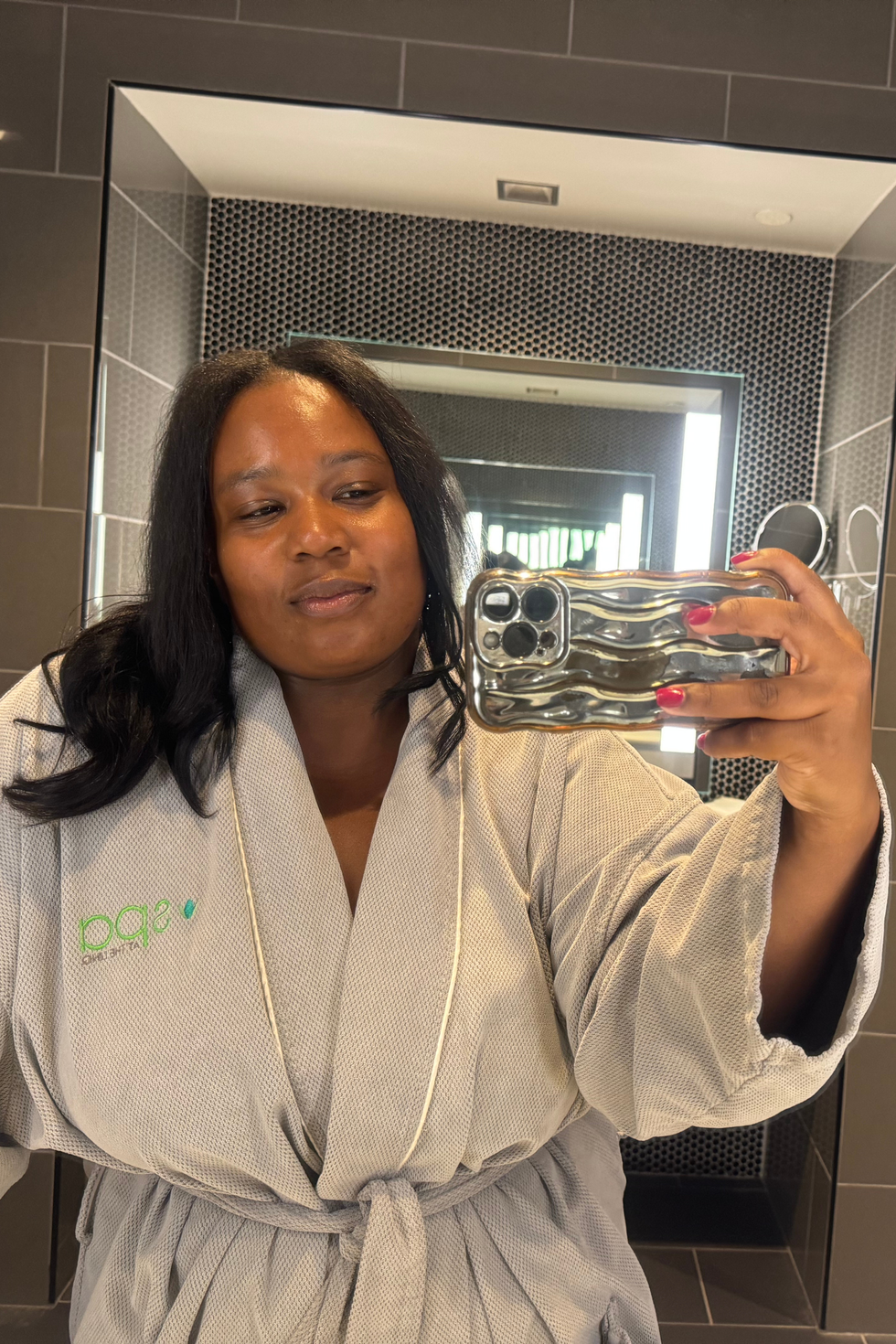
Courtesy
- 80-Minute CBD Mud Wrap with Foot Massage My first mud wrap ever. The therapist guided me through it, even letting me feel the clay, and ended with a foot massage I’m still dreaming about. She was so sweet and a local who gave me the 411 on how to experience the Strip the way locals do.
- 50-Minute Signature Facial I was paired with a Black esthetician who understood my skin. She gave me thoughtful recommendations and sealed my treatment with a serum that left me glowing and ready for a night out. She even complimented me on my daily skin care.
- 50-Minute Body Scrub I’ve never been a scrub girl (I had a Turkish scrub once that turned me off), but this one converted me. My skin felt renewed, and she even warmed up my lotion.
- 80-Minute Mind & Body Massage with Hot Stones + CBD I love firm pressure, and my therapist delivered. She let me choose an aromatherapy blend called Love, and the hot stones melted every ounce of tension.
All of my therapists were women of color, and that intentionality mattered to me. Each service ended with an affirmation card, and I left every treatment feeling cared for in a way that was personal.
Between services, I had a champagne lunch that felt like an episode of Girlfriends. I remembered watching those spa-day scenes growing up, thinking I couldn’t wait to have moments like that as a grown woman. Sitting there in my robe with my best friend beside me, sipping champagne and catching up on life before we got into the action and excitement of Vegas is a moment I’ll always remember. That and how crisp those grapes were that they had on our charcuterie board.
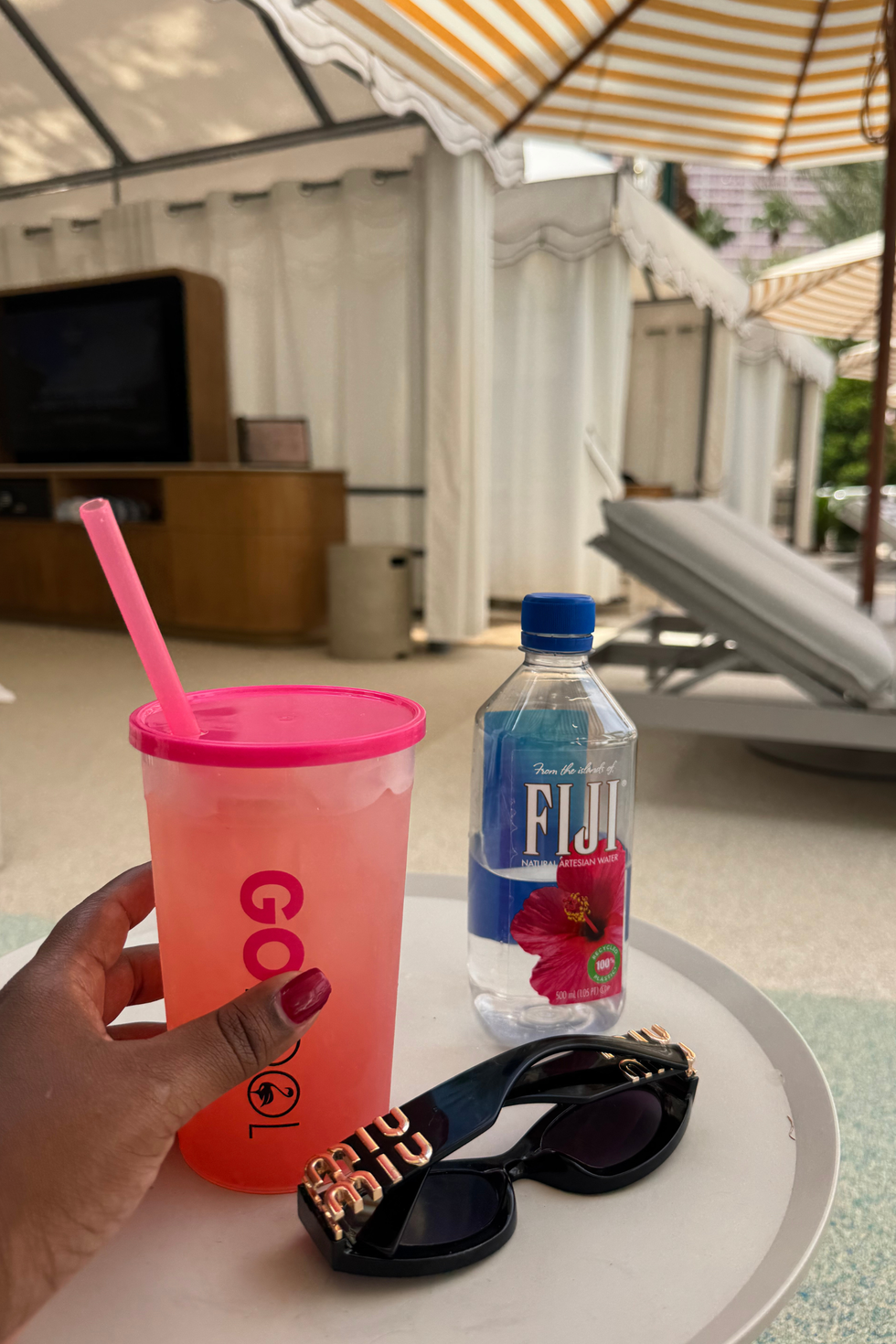
Courtesy
My Black Girl Luxury Vegas Recs
- Nobu at Caesars Palace My welcome dinner and the perfect kickoff to the weekend. Yellowtail jalapeño, wagyu beef, spicy tuna, shishito peppers, and a 24K gold-draped dessert you’ll only find in Vegas. Pure decadence. I also peeked at the Nobu Hotel tucked inside Caesars. If I came back, I’d definitely stay there.
- Rock + Roe at Caesars Palace I’m more of a R&B girly than rock-and-roll, but after some Veuve Clicquot and two caviar bumps, I was singing along to Stevie Wonder’s "Superstition," making friends with strangers (I had a very funny chat with a couple next to me who thought I was stood up and then discovered I was a journalist on a work trip and loved that for me) and I ended up staying until they closed at 2 a.m.
- Flamingo’s GO Pool Cabanas The go pool just underwent a $20 million renovation - and they truly spared no expense. My cabana felt more like a living room by the pool than a daybed, complete with couches, flat-screen TVs, IV drips, and a swim-up bar. I loved being close enough to the energy but tucked away enough to nap in peace, and I appreciated that they offered both cocktails and mocktails.
- Bacchanal Buffet One of the best brunch restaurants in Vegas. I went for the crab brunch, with short rib benedict, hashbrowns, eggs, seafood towers, and southern breakfast options that rival my favorite spots when I visit family in the deep South.
- Caramella at Planet Hollywood Their king crab scampi with fresh capers changed my life — and I was literally whisked into their speakeasy hidden behind a wall that looked like a candy shop. I thought the manager was just offering me a sweet for the road, but instead I ended up in a stunning club with some of the best music I heard all weekend. My only regret? Not staying longer because I had tickets to DISCOSHOW at The LINQ which was also fun! It felt like I was being transported back into the 70s and each floor had their own speakeasy bar.

Courtesy
What I Love Most About Vegas: It’s A Side Quest Playground
You could start your day at a crab brunch, end up in a salt cave by 3 p.m., and then find yourself in a beach club at 3 a.m. screaming every word while Jeezy performs. That kind of spontaneity felt healing in its own way.
As we get older, side quests become things we tell ourselves we don’t have time for. But the truth is, we need them more. Life gets heavier, and joy becomes an act of radical self-care. A reminder that you deserve to rest deeply and play wildly. There’s room for both.
Black women are leading leisure travel spending in the U.S., yet simultaneously report some of the highest daily stress levels. That’s why side quests aren’t indulgent for us. They’re necessary. Escapes filled with 24-karat gold desserts, naps in luxurious cabanas, healing waters, and spa days with our best friends aren’t frivolous — they’re what keep us grounded and remind us that rest and joy can coexist.
Black women don’t always get the mental space to play. Even if we have the financial means, so many of us don’t have the time or permission to just… daydream. To imagine. To follow a whim. Vegas gave me that space — and reminded me how much I deserve it. I can’t wait for my next side quest, whether it’s in Vegas or halfway across the world.
Let’s make things inbox official! Sign up for the xoNecole newsletter for love, wellness, career, and exclusive content delivered straight to your inbox.
Featured image by Shutterstock

